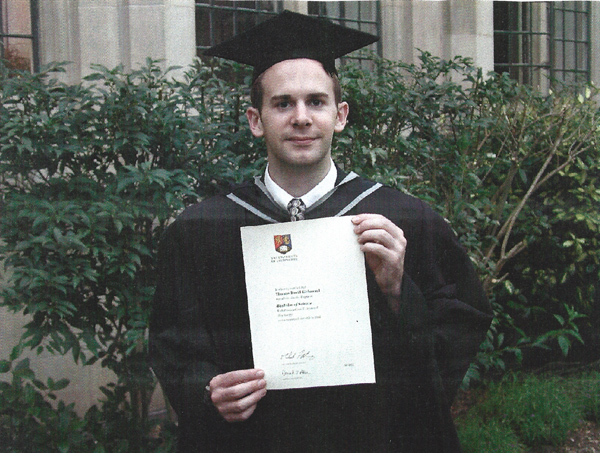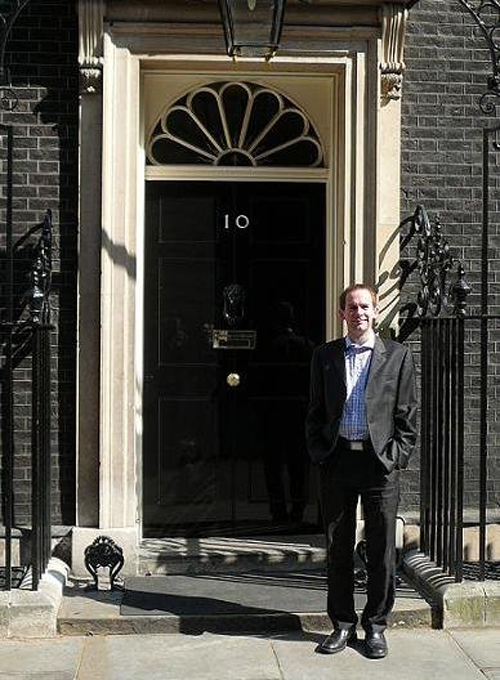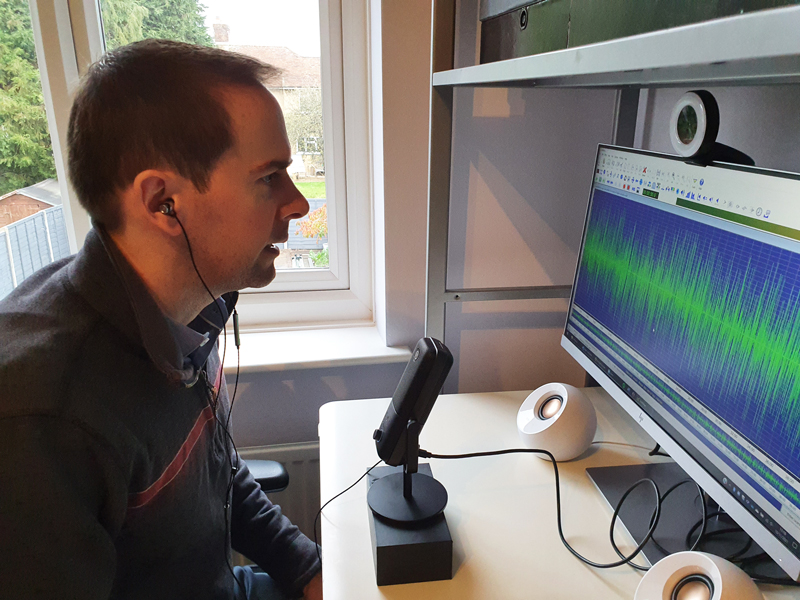Tom Richmond and his think tank get everywhere. How is one man who left teaching twice so influential in the busy world of education policy? Jess Staufenberg finds out
You have to admire Tom Richmond’s nerve. There aren’t many teachers who, after three years in the classroom, decided the Department for Education was messing up, thought they’d offer to help out – and ended up doing precisely that, as a civil servant adviser to Michael Gove and then-skills minister Matt Hancock.
He may also be unique in returning to the classroom, but deciding to set up his own think tank instead. He did so because, in his own words, “Brexit was sucking the oxygen” out of education policy debates.
Nowadays, Richmond and his thinktank, EDSK, are featured regularly across the press: his report in January on replacing GCSEs prompted headlines across national and trade media. The debate on exams reform has been in full flow since.

Yet Richmond says “in the first 25 years of my life, I’d never shown the slightest interest in politics. I was aware it happened, but I hadn’t studied politics, and I wasn’t interested. Until I went into the classroom.”
He is the third of four children, born to a software developer father and a mother who retrained as a modern languages teacher to help pay for his fees at Haberdashers’ Aske’s private school. Having taken biology, geography and maths A-levels, Richmond was at a loss what to study next, when he came across a “dusty old psychology textbook” in the library.
“I absolutely fell in love with the subject in the space of a single book”, he says. He studied psychology at Birmingham University, then decided to “dig into the practical side” and turned to teaching. He took a PGCE at the UCL Institute of Education, followed by a masters in child development, and volunteered for Childline. The initial goal was to “share the love of my subject”.
But this was soon overtaken by another preoccupation, in his first job at an all-girls grammar school in 2004. “I started, like many teachers around the country, being the recipient of how things should work,” he begins. “And it dawned on me that some very strange decisions were being made.”
It dawned on me some very strange decisions were being made
At the time, New Labour was seeking to switch from six to four A-level units. “I thought, there may be arguments for this, but the disruption it will cause me, compared to any real benefits to my students, is surely wrong. Who is advising these politicians?”
But is someone with only three years’ teaching experience well placed to advise ministers?
“It felt to me there were very few perspectives from teachers getting through. Later, a lot of people who moved into policy and advisory roles came through Teach First.” But “there wasn’t really a crop of young teachers trying to make a difference using what they’d learnt” when he left his school in 2007.
First, he became a research intern with Conservative MP Andrew Turner, then a researcher at the Social Market Foundation on reforming benefits. His first job in education policy was at the Policy Exchange think tank from 2008 to 2009, under schools policy expert Sam Freedman, who later also advised Gove. Policy Exchange is seen as right-wing leaning – given his work for Turner, is Richmond on the right?
“I wasn’t strongly political. I’d been a member of a teaching union before,” he shrugs, before saying it was the sense of coming change that appealed to him. “It was healthy that a new government came in in 2010, and said ‘some things are not working, we’re not convinced by coursework, and attainment around the C/D borderline is a problem’.” He adds: “Policy Exchange became an ideas-generating machine, and I found that very exciting.”

It was here that Richmond became a school teacher deeply interested in skills (the clue is in the name of his think tank, which is short for “Education and Skills”). Freedman was clear this was a “huge blind spot” in policymaking, says Richmond. Digging into apprenticeships and colleges has made a lasting impression.
“One of the things it rammed home to me was that we have these enormous cliff edges in our education system, and we have no concept, it seems, of making a smooth transition from the world of education to employment. I’ve never seen another country treat it like that. They work much harder to blend the world of education and employment, where employers are much more freely involved in the world of education.”
He raises his eyebrows. “We know the scarring effects. I find it immensely frustrating.”
If one were to use lazy definitions of ‘progressive’ and ‘traditional’, Richmond sounds much more down the ‘prog’ road at this point. Having advised the Chartered Institute of Personnel and Development, and been head of policy on the Welfare to Work programme for unemployed adults at G4S, Richmond found himself being interviewed by Hancock to advise the government on skills in 2013.
Given his ideas, how did he put up with a department that was pushing the academically focused Ebacc? “Well, Gove had obviously been fighting ‘the blob’, and a lot of people would say Gove only cares about academics but […] it became clear to me that there was a lot of desire in government to get apprenticeships sorted.”
Was it not frustrating watching schools minister Nick Gibb push any ‘skills’ focus out of the curriculum? I press. Richmond replies delicately: “Because I was so busy, honestly, I didn’t have much time to think about anything else.”

After two years at the DfE, he wanted to return to working with young people and joined a selective sixth-form college in 2016. It had been almost ten years since he’d been a teacher. How was it this time?
“I was working 60- or 70-hour weeks, which was strangely reminiscent of me being in teaching before,” he says. “I was not able to shave off any hours in the week, even though I knew the reforms were coming.”
The job was clearly not done. So, after a couple of research fellow posts, he founded EDSK in 2019.
I was working 60 or 70 hour weeks
The output has been immense: ten reports, usually around 60 pages, with four on schools. The Requires Improvement report on Ofsted, which was EDSK’s first ever publication, calls for government to scrap the four overall grades, and introduce a school ‘score card’ packed with information instead (Richmond adds the report was “one of our most impactful” for press coverage).
A Step Baccward concludes the EBacc should be “withdrawn with immediate effect” and is damaging arts provision. There’s also Trust Issues on the academy system, and a two-part report on the future of GCSEs and A-levels.
“Bearing in mind other think tanks have had a 20-year head start, setting up a new think tank in this environment is a steep learning curve,” smiles Richmond. It’s funded through sponsored research, events and an annual ‘partnership’ scheme for supporters.
Its success is likely down to a multitude of factors. First, Richmond can write exceptionally clearly, and makes bold recommendations aimed straight at the DfE – a win with journalists and policymakers alike.
Second, he can think around the stickiest of problems. Take Trust Issues, in which Richmond outlines his imagined “The State School System Act 2020”. To help knit the systems together, academies would be renamed ‘independent state schools’ and would be separate legal entities that could join any group they wish, including groups of ‘state schools’ (local authority schools). There are holes, but it’s well worth a read.
Finally, it definitely helps when journalists can say ‘a former Michael Gove advisor says’. Now, he’s even set up a new podcast to discuss the issues of the day further. Taken together, these factors have made Richmond an unusually powerful former teacher.

Yet the fact remains he was pushed out of the classroom, twice. Richmond admits of his last stint: “They were two very tiring and exhausting years.”
Leaving the classroom has worked out for Richmond, but perhaps his next big report could focus on workload, and keeping those other burnt-out teachers in the classroom?
Richmond has no immediate plans to focus on workload, but he warns: “Any major policy reforms are likely to be much less effective, if they don’t take teachers with them.”













Your thoughts